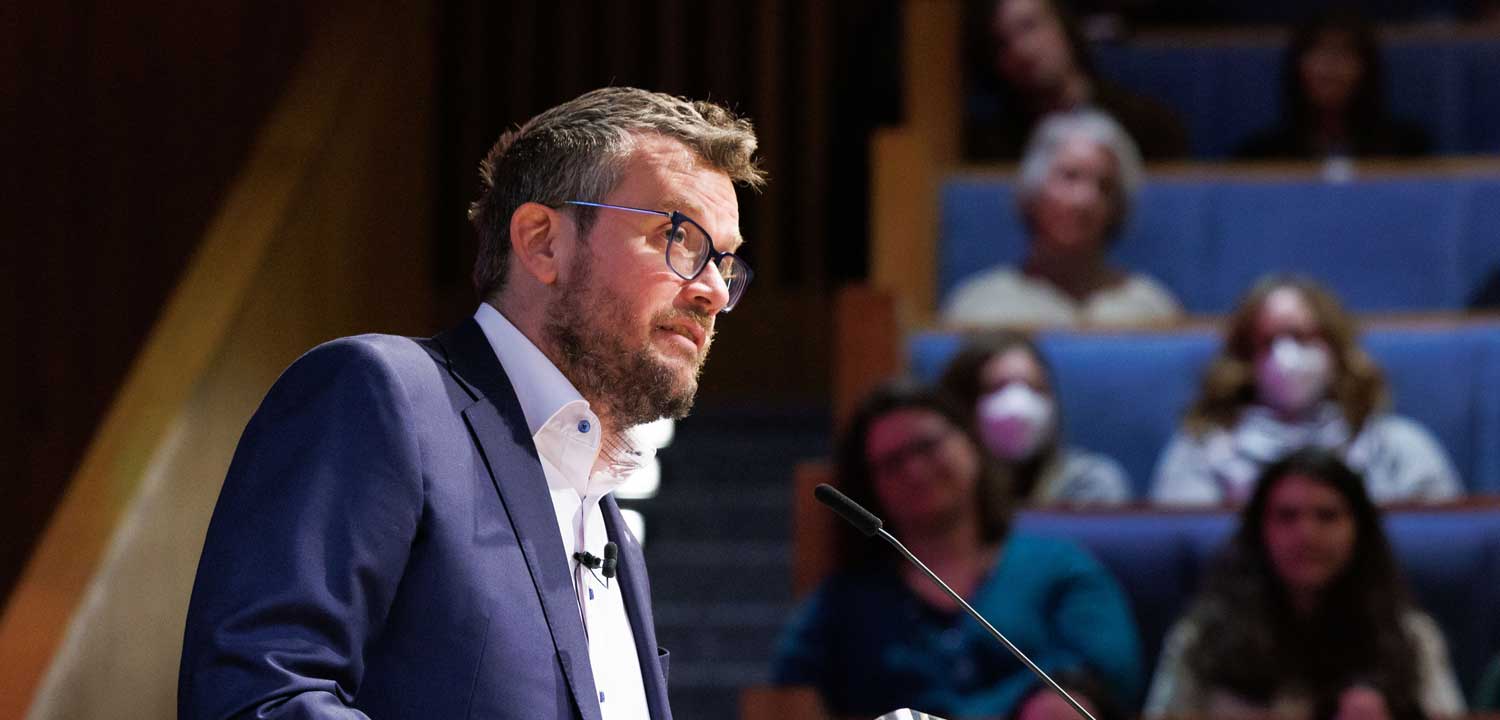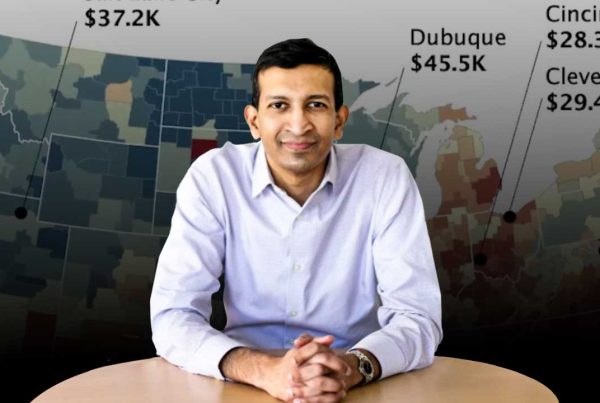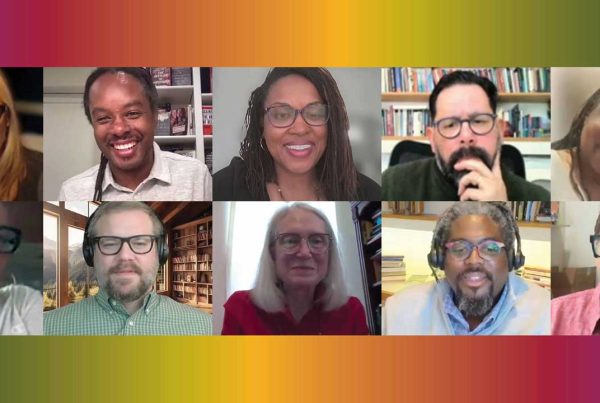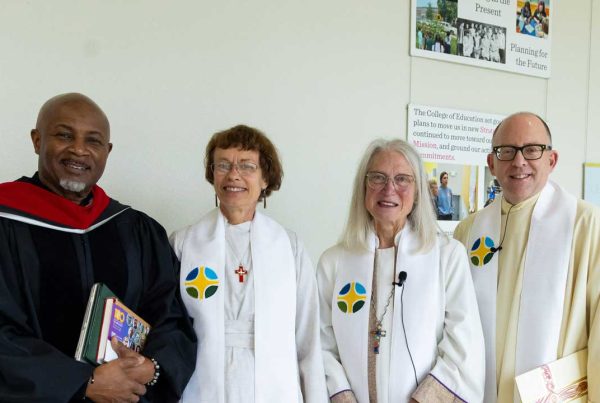John Green at CTS: The Power of Human Choice
On February 6, author and activist John Green spoke to a sold out audience in Shelton Auditorium for a special Centennial CTS Talks presentation. The evening marked a bright spot of hope in the midst of what has been a tumultuous few weeks in our country and world. Green’s talk, titled “In These Last Days,” addressed the concerns of apocalyptic anxiety and despair while considering the possibility of a radical hope that might withstand the struggles of our time. It also touched on the responsibility humans have in the face of inequality.
In a special conversation with CTS students prior to the main event, Green took questions and talked about the overlap of counseling and theology, speaking from his personal experience during two CPE chaplaincy placements at a children’s hospital early in his career. He shared, “I think the most important work we do is person to person. I’ve been fortunate to be able to have a lot of cool jobs over the course of my life, but the most important work I ever did or will ever do was at the hospital because it was person to person. That’s the scale at which we deeply change and shape each other. Sometimes it can be frustrating because we look at the broader social order and we want to make big social change, and I think that’s possible and important, but the person to person work is absolutely critical. That’s where you really change people and open people’s minds up. I’m not convinced that Vlogbrothers, despite its reach, could change a single vote. I’m really not. But I have experienced person to person interactions that can.”
When asked about his decision to come to CTS, Green responded, “One thing I really admire about CTS is the ecumenical approach and the ability to bring together lots of different people. When I was a chaplain at the children’s hospital, one of my fellow chaplains was a Catholic nun and one of them was an evangelical Christian pastor and one of them was an AME pastor and then there was little old me, and it was wonderful to be in such a group of people who were seeking the same meaning through different paths. It’s long been something I really valued. That’s one of the reasons I wanted to come.” He continued, noting CTS’ core values and reflecting on their importance. “We have to make space for everybody, working toward justice for all. Working toward justice is an imperative of Christian life. I think that’s so true, and that resonates with me really deeply. I also think that we can’t pretend that embracing diversity or working toward justice is easy or uncomplicated work. It’s messy and difficult and when you get in the daily grind of it, it can feel like there are more losses than wins.”
The group discussed how important it is to take action, even though it can feel overwhelming trying to figure out the first step. One student brought up Green’s efforts to oppose book banning and his advocacy for tuberculosis awareness, asking if he foresees continuing similar work in the future. Green shared his current focus is on tuberculosis activism, noting the value of focusing one’s advocacy efforts to avoid feeling overwhelmed or paralyzed from taking action. His upcoming nonfiction book “Everything is Tuberculosis” releases on March 18 and is the culmination of years of research and writing about the disease. Green reflected, “There are so many directions in which to be panicked and overwhelmed right now. This is what I happen to know about, this is what I happen to have an expertise in that I’ve spent the last 5 years learning about, and so that’s where I’m going to focus my energy. I’m counting on other people to focus their energy in other places… I want to support those people, but still pick my lane, pick my area of expertise where I feel like I can do the most good.”
Green also noted how difficult it can be to stay focused when it feels like there are so many causes that need support. He suggested paying attention to one’s calling and recognizing the importance of centering the most vulnerable people in our communities as we work towards a better future. “Most of what I have is commiseration to share, and concern – deep concern for the most marginalized people who are always the people who suffer the most in times like this. It’s always going to be the people who Jesus put at the center and the social order puts at the margins who are most affected, and I think it’s pretty clear to me what I’m called to do in that situation,” said Green.
The energy carried over into Shelton Auditorium, where a packed audience eagerly awaited Green’s keynote address. CTS President David M. Mellott welcomed the audience, providing history and context for CTS’ 100th Anniversary as well as remarks on the present moment in history.
“This year, we are featuring three nationally and internationally known speakers working at the intersection of public life with healthcare, religion, theology, and social systems,” Mellott shared about the CTS Talks series. “CTS continues to build upon this foundation of religious and social transformation which you can see in the values upon which we live and work. All people, and I mean ALL people, are created in the image of God and therefore have inherent worth and dignity; and working toward justice for all is an imperative of Christian faith and life. We at CTS are not wavering from these values. In fact, now is the time to embody those more loudly and more proudly. I believe the world needs CTS. The world needs you, friends. And we need each other. Seeing such an impressive crowd gathered here this evening gives me a lot of hope. I hope it does the same for you.”
Green took the stage, speaking for 45 minutes before an enrapt audience. He addressed how odd it is that we are the only species we know of with both consciousness and such great power and influence over the world around us. “Every species on earth has what is called a temporal range – the length of time they get to be a species… We’re not the first species to become so powerful on Earth that we muck up the climate and threaten the planet’s biodiversity… but we are the first species to know what we’re doing while we do it,” shared Green. “What I need to know is what to do with the strange miracle of my consciousness; how to live and grieve and hope in a world where everything we’re certain of will end.”
He highlighted the power of human choice, both through action and through lack of action. “It’s important to remember that we choose the world we share – not entirely, of course – but to a great degree. And we could live in a world without tuberculosis. We could live in a United States without tuberculosis. Almost everybody who gets TB is living in marginalized situations, often living in shelters, often working in crowded workplaces – sweatshops and crowded factories – and taking overcrowded public transport to school or work each day. The argument of my book is that tuberculosis in the 21st century is not really caused by a bacterium anymore. It’s really caused by human built systems. It’s really caused by human choice. We know that we can choose a better world. We know that we can choose a world where we embrace more people as full members of the human story and affirm their rights to access to healthcare and educational opportunities. We know that we can do that because we have done it. The year I graduated from high school 13 million children under the age of 5 died, and last year fewer than 5 million did, so we know that we can make progress on these important issues. But that progress is not inevitable, it’s not natural, and I am deeply concerned that we may see reverses in it.”
The author was given a standing ovation as he transitioned from the podium to a more intimate moderated conversation with CTS Professor Dr. Nick Peterson. Audience members asked questions, wondering how we might inspire others in our community to take action on issues like the tuberculosis epidemic. Green suggested we start small, with person to person conversations in our spheres of influence. He shared, “The moment we become proximal to that suffering, to that fear… suddenly we care. The question for me is, how do we make ourselves proximal to the most marginalized people in the world, who don’t have the megaphone, who don’t have access to the microphones that I do. That’s what I try to do in this book.”
Through his CTS Talk, John Green was able to recognize the overwhelming anxiety of the current moment while still recognizing our power to choose a better world through activism and action. His signature style of humor blended with genuine humility and powerful prose left the audience feeling emboldened, inspired, and hopeful that our community has the ability to choose a better future.
Stay Tuned for More CTS Talks! Click here to learn about our next CTS Talks speaker Dr. Eleazar S. Fernandez and his topic “Sin and Power: Our Socio-Ecological Unraveling.”






